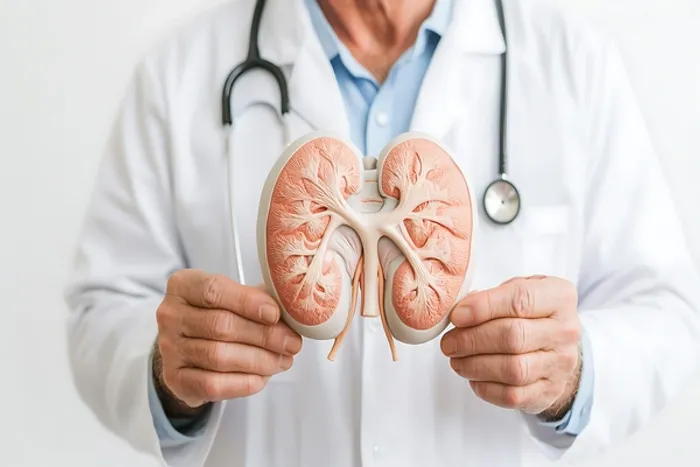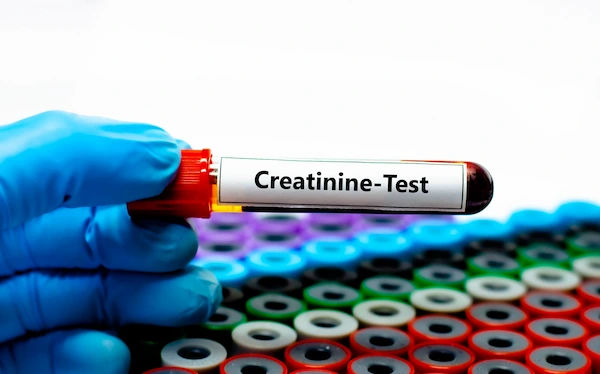Your Kidney Health Monitor: Understanding and Managing Creatinine Levels
Know about kidney health, what creatinine levels are, levels of creatinine explained, and how tweaking diet and lifestyle changes help in altering creatinine levels.


Introduction
Your kidneys are the unsung heroes of your body, working tirelessly 24/7 to filter waste, balance fluids, and regulate blood pressure. But how do you know if these vital organs are performing optimally? The answer often lies in a simple yet powerful biomarker: your creatinine level. Acting as a built-in kidney health monitor, this waste product measured through a routine blood test provides a crucial glimpse into your renal function. This comprehensive guide will demystify creatinine, explain how to monitor it, and empower you with practical strategies to support your kidney function for long-term health.
What is Creatinine? The Waste Product That Tells a Big Story
Creatinine is a chemical waste molecule generated from muscle metabolism. It's a natural byproduct of the everyday wear and tear on your muscles. The more muscle mass a person has, the more creatinine their body produces. This compound is released into the bloodstream and is then filtered out almost entirely by the kidneys to be excreted in urine. Because its production rate is relatively constant and it is cleared almost exclusively by the kidneys, the level of creatinine in your blood is a very reliable indicator of how well your kidneys are doing their filtration job. Think of it as the smoke coming from a factory's chimney; if the smoke isn't clearing properly, it's a sign the filtration system (your kidneys) might be clogged or inefficient.
Consult a Nephrologist for Personalised Advice
Where Does Creatinine Come From? The Muscle Metabolism Connection
The primary source of creatinine is creatine phosphate, a molecule stored in muscles that provides the rapid energy needed for muscle contraction. When this energy is used, creatine phosphate is broken down, and creatinine is formed as a waste product. This is why individuals with greater muscle masssuch as athletes or bodybuilders, naturally have higher baseline creatinine levels than those with less muscle mass. It's also why levels can be temporarily elevated after an intense workout due to increased muscle breakdown.
The Creatinine Test: Your Window into Kidney Function
The standard test to monitor kidney function is a blood test called a Serum Creatinine test. It's a common part of routine blood work panels like the CMP (Comprehensive Metabolic Panel) or BMP (Basic Metabolic Panel). The process is simple: a small blood sample is drawn from a vein in your arm and sent to a lab for analysis. The result is a number expressed in milligrams per deciliter (mg/dL) or micromoles per litre (μmol/L).
Understanding Your eGFR: The Gold Standard of Kidney Function
While the creatinine number itself is useful, the most accurate assessment of kidney function comes from the estimated Glomerular Filtration Rate (eGFR). This is not a direct measurement but a calculation based on your serum creatinine level, along with your age, sex, and sometimes race. The eGFR estimates how many millilitres of blood your kidneys can filter per minute. A higher eGFR indicates better function. Doctors use eGFR to stage chronic kidney disease (CKD):
- Stage 1: eGFR 90 or higher (normal with signs of kidney damage)
- Stage 5: eGFR less than 15 (kidney failure)
Decoding Your Creatinine Levels: What the Numbers Mean
Understanding your results is crucial. However, it's vital to remember that these are general guidelines, and your doctor will interpret them in the context of your overall health.
Normal Creatinine Range by Age and Gender
Due to differences in muscle mass, "normal" ranges vary.
- Adult Males: 0.74 to 1.35 mg/dL (65 to 119 μmol/L)
- Adult Females: 0.59 to 1.04 mg/dL (52 to 92 μmol/L)
- Children: Will have lower values, typically around 0.2 to 1.0 mg/dL.
What Causes High Creatinine Levels? (Beyond Kidney Disease)
While high levels most commonly point to impaired kidney function (e.g., CKD, acute kidney injury, kidney infection), other factors can cause a spike:
- High-Protein Diet: Excessive consumption of red meat or protein supplements.
- Strenuous Exercise: Recent intense physical activity can temporarily elevate levels.
- Certain Medications: Some antibiotics, ACE inhibitors, and nonsteroidal anti-inflammatory drugs (NSAIDs) like ibuprofen.
- Dehydration: Reduced blood flow to the kidneys impairs their ability to filter.
- Muscle Conditions: Rhabdomyolysis, a serious syndrome involving rapid muscle breakdown.
How to Lower Creatinine Levels Naturally: Diet and Lifestyle Tweaks
If your levels are mildly elevated due to lifestyle factors, several natural approaches can support your kidneys. Always consult a doctor before making significant changes, especially if you have a diagnosed kidney condition.
The Power of Hydration: Water as Your Kidneys Best Friend
Dehydration is a common and reversible cause of elevated creatinine. Adequate water intake ensures optimal blood volume and pressure, allowing your kidneys to filter blood efficiently. Aim for 8-10 glasses of water a day, unless your doctor has advised fluid restriction due to advanced kidney disease.
Dietary Do's and Don'ts: Managing Protein, Phosphorus, and Potassium
Diet plays a pivotal role in how to reduce creatinine level naturally.
Foods to Embrace for Kidney Health:
- * Fibre-Rich Foods: Fruits, vegetables, and whole grains can help eliminate toxins.
- * Healthy Fats: Sources like olive oil and avocados.
- * Moderate, High-Quality Protein: Opt for plant-based proteins (lentils, beans) or lean fish and poultry in moderation, as advised by a doctor or dietitian.
Foods to Limit or Avoid:
* Excessive Red Meat: Creates more creatinine and can be hard on the kidneys.
* High-Sodium Foods: Processed foods, canned soups, and salty snacks can increase blood pressure, damaging the kidneys over time.
* Added Sugars: Contributes to obesity and diabetes, the leading causes of kidney disease.
Conclusion
Monitoring your creatinine level is one of the most effective and accessible ways to keep a pulse on your kidney health. It transforms an abstract concept of organ function into a tangible number you can understand and act upon. By embracing a lifestyle that includes proper hydration, a balanced diet, and regular check-ups, you empower yourself to protect these vital organs. Remember, knowledge is power. If you have concerns about your creatinine levels or are experiencing symptoms, consult a doctor online with Apollo24|7 for expert evaluation and personalised advice.
Consult a Nephrologist for Personalised Advice
Consult a Nephrologist for Personalised Advice

D. Akshay Zalavadiya
Nephrologist
3 Years • MBBS, MD, DM Nephrology
Ahmedabad
Beacon kidney consult, Ahmedabad

Dr. Siddharth Herur
Nephrologist
4 Years • MBBS, MD General Medicine, DM Nephrology
Kurnool
Medicover hospital and Gurudatta poly clinic, Kurnool

Dr. Anantha Rao
Nephrologist
7 Years • MBBS, DNB (General Medicine), DNB (Nephrology)
Kurnool
Aakash hospital and KIMS hospital, Kurnool

Dr. Tanmay Mukherjee
Nephrologist
13 Years • MBBS , MD (General medicine) , DNB (Nephrology)
Kolkata
Foresight Clinic and Diagnostic, Kolkata

Dr. Luvdeep Dogra
Nephrologist
10 Years • MBBS, MD, DM (NEPHORLOGY)
Jaipur
Dr Dogras Health Clinic, Jaipur
Consult a Nephrologist for Personalised Advice

D. Akshay Zalavadiya
Nephrologist
3 Years • MBBS, MD, DM Nephrology
Ahmedabad
Beacon kidney consult, Ahmedabad

Dr. Siddharth Herur
Nephrologist
4 Years • MBBS, MD General Medicine, DM Nephrology
Kurnool
Medicover hospital and Gurudatta poly clinic, Kurnool

Dr. Anantha Rao
Nephrologist
7 Years • MBBS, DNB (General Medicine), DNB (Nephrology)
Kurnool
Aakash hospital and KIMS hospital, Kurnool

Dr. Tanmay Mukherjee
Nephrologist
13 Years • MBBS , MD (General medicine) , DNB (Nephrology)
Kolkata
Foresight Clinic and Diagnostic, Kolkata

Dr. Luvdeep Dogra
Nephrologist
10 Years • MBBS, MD, DM (NEPHORLOGY)
Jaipur
Dr Dogras Health Clinic, Jaipur
Frequently Asked Questions
What is a dangerously high level of creatinine?
A creatinine level above 5.0 mg/dL for adults is considered very high and often indicates severe kidney impairment, potentially requiring medical interventions like dialysis. However, the threshold for danger depends on individual factors like age and muscle mass, so a doctor's assessment is essential.
Can drinking water lower creatinine?
Yes, if your elevated creatinine is due to mild dehydration, drinking water can help lower it by improving kidney filtration and blood flow. However, water cannot reverse damage from chronic kidney disease.
What are the early signs of kidney disease?
Early signs are often subtle and can include fatigue, trouble sleeping, poor appetite, muscle cramps, swollen feet/ankles, puffiness around the eyes, and changes in urination frequency and appearance.
How often should I get my creatinine levels checked?
For most healthy adults, it may be checked during an annual physical. If you have risk factors like high blood pressure, diabetes, or a family history of kidney disease, your doctor may recommend more frequent monitoring, such as every 6 months.
Are at-home kidney test kits accurate?
While at-home test kits that use a finger-prick blood sample can provide a general indication, they are not as accurate as a traditional venous blood draw analysed in a certified lab. For a definitive diagnosis and monitoring, lab tests are recommended. Apollo24|7 offers convenient home collection for tests like creatinine and eGFR, ensuring accuracy and comfort.

